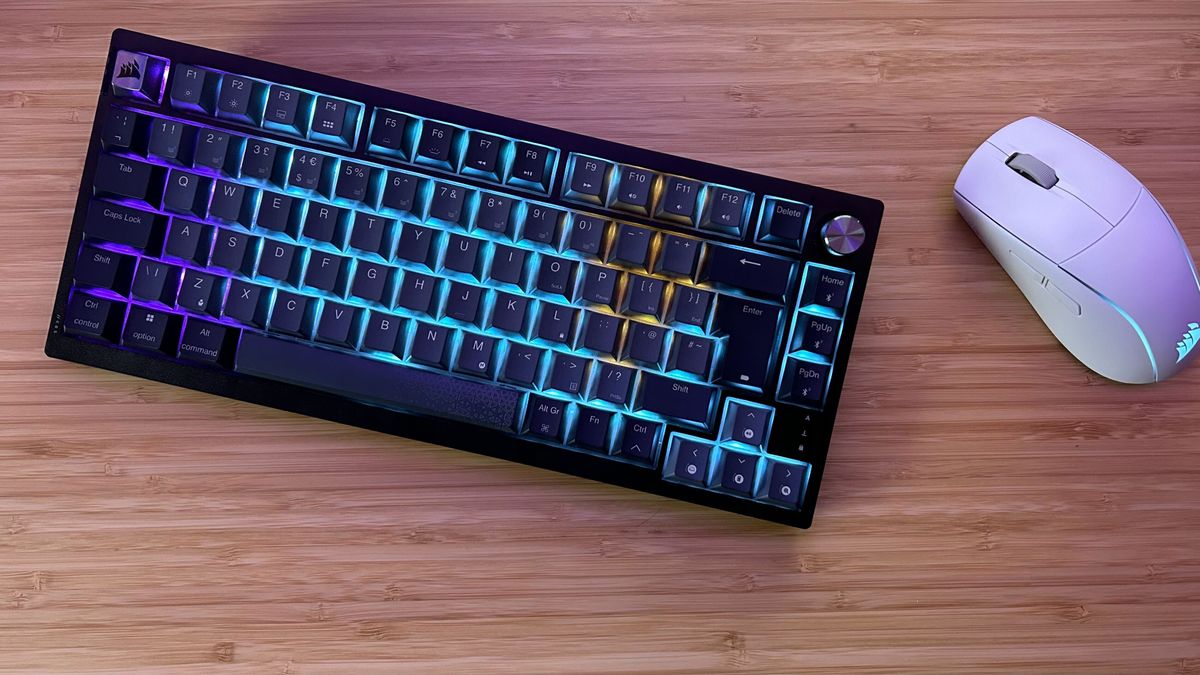12DOVE Verdict
The Corsair K65 Plus Wireless is the best value hot-swappable 75% gaming keyboard on the market right now. That's a niche pool of users to be sure, but it's a breed of keyboard that's rapidly growing. With a slick typing feel, plenty of extra controls, and PC and Mac wireless compatibility this is a fairly priced powerhouse.
Pros
- +
Excellent value for money
- +
Soft, smooth switch feel
- +
Small form factor
- +
Fantastic wireless compatibility
- +
Plenty of extra controls built in
Cons
- -
Cheaper build materials than the competition
- -
Legends are difficult to see in low light
Why you can trust 12DOVE
After Asus brought the Azoth to market at the start of last year, gaming brands have been racing to unveil their own hot-swappable 75% gaming keyboards. The coalition between custom and gaming decks has been well and truly formed, and now Corsair is joining Asus, Alienware, and Razer with its own contender. The Corsair K65 Plus Wireless shrinks a TKL gaming keyboard down even further, dropping everything must the most necessary of navigational keys while still maintaining vertical height for a full function row and media controls.
This is an Azoth lookalike through and through, even down to the two-tone keycaps. However, with a $159.99 / £149.99 MSRP that savagely undercuts Asus's reigning champion, Corsair's new release is out for blood. I put the latest switch-swapping deck to the test to see whether it can take on the rig currently sat at the top of our guide to the best gaming keyboards on the market.
| Price | $159.99 / £149.99 |
| Type | Mechanical (hot-swappable) |
| Connection | 2.4GHz / Bluetooth / wired |
| Size | 75% |
| Switches | Corsair MLX Red linear |
| Keycaps | PBT |
| Media keys | Multi-function dial |
| Wrist rest | None |
| USB passthrough | None |
| Battery | Up to 266 hours (no RGB) |
Design
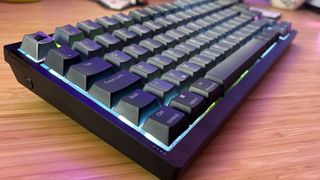
Custom keyboard fans will be well versed in the aesthetics of the Corsair K65 Plus Wireless. From the subtle navy blue and dark gray keycap design to the boxy, minimalist form factor, the K65 Plus has lifted straight from the high-end design book here. Just like the seemingly metal escape key (it's just a metallic paint coated on top), though, this is primarily an aesthetic choice. You don't get the full metal construction you might find in a more traditional custom deck, opting instead for a plastic chassis housing steel and metal plates within.
Still, that additional internal weight means this is a solid keyboard to keep on the desk - it didn't budge during my testing and while it's not as hefty as something like the Keychron Q2 it's certainly got a solid weight to it. That weight doesn't make it feel quite as premium as the Asus ROG Azoth or Razer BlackWidow V4 75% which both use higher end materials (but come at a higher price point).
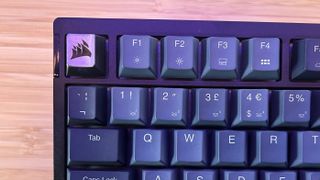
The keycaps themselves are formed from super durable PBT, though rather than a doubleshot set of legends you'll find dye-sublimated icons up top. These are still pretty tough caps, but there is more of a chance of fading here. That might prove to be a problem considering the number of double functions mapped to each key. This is a larger 75% design, so there's more dedicated clickers than you'll find in a 60 or even 65% device, but Corsair has an impressive array of extra features baked in. Indicators for these controls are all printed directly on top of the cap.
It's not so much the legends I'm worried about here - but more the fact that these caps aren't shine through. The RGB lighting sits around the edge of the key only, rendering each one illegible as soon as the lights are out. You'll be relying on muscle memory a lot more here.
The K65 Pro Wireless also, obviously, has Corsair's LEDs under the hood for its RGB effect. I've never personally fared well with this brand's lighting. The colors are generally a little too washed out for me, and never seem to achieve the same level of sharp clarity as Razer's. That's all personal opinion, but if you do prefer a more refined set of lights there are better options out there.
Still, everything feels durable and sturdy under the hand, with a soft ever so slightly grainy texture to each key that makes for a particularly soft experience while still providing excellent accuracy and no slips. There's very little flex to the device as a whole - I was only able to bend the proportions slightly when pushing down with all my might - and considering the smooth linear switches inside that's not something you're going to be doing too often.
Features
Corsair's recent keyboards have been packed with additional features, and the K65 Pro Wireless is no exception. Aside from those hot-swappable switch pockets you'll find excellent wireless compatibility, unique RGB controls, a dedicated multi-functional control dial and a solid suite of software features to keep everything running.
The actual layout of the deck prioritizes arrow keys and Home, Page Up, and Page Down buttons along the right hand side for navigation. The Delete key has been shifted up to the function row - something I haven't seen before, but didn't take too long to get used to. Along the top you'll find the standard USB-C port for charging and a wired tether should you need one, as well as a switch to toggle between the three connection options (2.4GHz, Bluetooth, and wired).
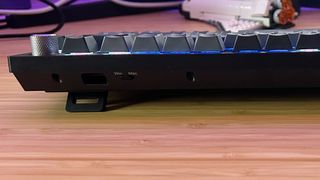
That's all pretty standard - what's new here is the ability to swap between a PC and Mac input. The K65 Pro Wireless is compatible with both camps, and even has MacOS legends printed on the keycaps themselves. That's a massive benefit for anyone who straddles both territories, and even for those using a Mac full time - very few wireless gaming keyboards support Jobs. It's also worth noting that the K65 is also fully compatible with Xbox and PlayStation for even more connection options.
Around the left hand side you'll find another surprise. A small button can toggle your RGB lighting on and off with just a simple click - it's not a massive feature, and it didn't change my life during testing, but it's a nice to have.
That level of control continues across the main deck as well. The arrow keys are already mapped to some handy additional functions straight out the box. By default you've got volume, RGB, and even zoom and scroll controls down here - handy considering the dial up top can perform similar functions. You're never, for example, dropping the ability to adjust volume if you set the dial to scroll instead. That's a flexible way of sorting media controls, but I did find myself missing the dedicated playback buttons of the Razer BlackWidow V4 75%.
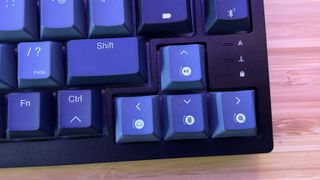
That's how I had my deck setup, though I wasn't exactly spoilt for choice in iCue. This control dial is by no means up to the standard set on the Razer BlackWidow V4 Pro - and even that buffed up version was underwhelming. Customizability options are limited here, and essentially replicate those found on the arrow keys.
The actual keys are powered by Corsair's own MLX Red linear swithces, offering 45g of resistance with a 4mm total travel and 1.9mm actuation point. That puts their specs on par with the standard Cherry MX Red options, with a 0.1mm difference in actuation travel. Of course, those clickers can always be swapped out.
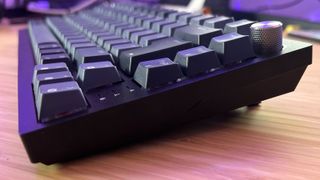
Like many hot-swappable keyboards, those switches benefit from two layers of dampening; with foam on top of the PCB and a silicone layer beneath. That's it for additional mods offered, though - this is a step back from the pre-applied tape modding of the Razer BlackWidow V4 75% or the additional gasket mounts and third layer of Poron foam in the Asus ROG Azoth. The whole deck is easy to crack open, but Corsair doesn't cover your experiments in its warranty.
Battery life is solid with RGB switched off - Corsair estimates up to 266 hours of playtime without those LEDs blaring. I played with RGB on and managed to squeeze around 30 hours out of the device, running it for three work days with gaming in the evening thrown in. That's a marked reduction from the Azoth's massive 2,000 hour no-RGB charge, though.
Performance
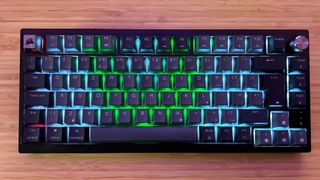
The linear typing experience in the Corsair K65 Plus Wireless is extraordinary. The brand is typically plagued by incredible rattle and stabilizer ping, but there's no reverb to speak of here. The smooth linear switches feel great under hand, with a soft landing position and just the right level of sensitivity to remain nimble but avoid accidental presses. The switches themselves are heavier than those of the Azoth but lighter than Razer's, though without the satsifying clunk of the latter's Orange option. While I do still prefer the ROG NXs straight out of the box, this is a fantastic feel all in.
Actuation points are light enough to feel particularly responsive under the fingertips, while also feeling solid enough to provide satisfying feedback. The stabilizers are a little rockier, though, leading to some shakiness in the space key.
While the K65 Plus Wireless taps out at a 1,000Hz polling rate, this was more than enough speed for my everyday play. Inputs were snappy and responsive, and those speedier switches made for particularly fast rapid press action as well.
Should you buy the Corsair K65 Plus Wireless?
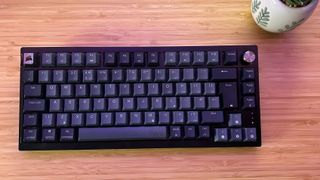
I would recommend the Corsair K65 Plus Wireless to anyone locked out of the Asus ROG Azoth's price range. This is an impressive piece of kit considering its price, offering a luxury typing feel with plenty of customization and a wad of additional features baked in. I was surprised to learn the final cost once I'd already had my hands on these caps for a couple of days, this feels like a deck punching well above its price tag - especially considering competitors are pitching a little higher.
However, there are some drawbacks that stop the Corsair K65 Plus Wireless from taking Asus's top spot. The cheaper construction, lower battery life, and heavier switches aren't offset by that lower price point and additional Mac functionality overall. If you've got the budget for it I would still recommend the Azoth instead.
The Razer BlackWidow V4 75% is in a more competitive price range, adding only $30 to Corsair's $159.99 MSRP. For that extra cash you get a wrist rest included, doubleshot keycaps, arguably more satisfying switches out the box, and a better selection of media controls, though you take a hit with that wired-only design. This one's down to priorities, then. If you can't live with a tethered keyboard, Corsair is your go-to. If you'd prefer a more robust onboard experience, Razer's still up top.
| Specs | Corsair K65 Plus Wireless | Asus ROG Azoth | Razer BlackWidow V4 75% |
|---|---|---|---|
| Price | $159.99 / £149.99 | $249.99 / £269.99 | $189.99 / £189.99 |
| Type | Mechanical (hot-swappable) | Mechanical (hot-swappable) | Mechanical (hot-swappable) |
| Connection | 2.4GHz / Bluetooth / wired | 2.4GHz / Bluetooth / wired | Wired |
| Size | 75% | 75% | 75% |
| Switches | Corsair MLX Red linear | ROG NX | Razer Orange Tactile Mechanical Gen 3 |
| Keycaps | PBT | Doubleshot PBT | Doubleshot ABS |
| Media keys | Multi-function dial | Multi-functional clicker | Dedicated volume roller with 2x media buttons |
| Wrist rest | None | None | Detachable |
| USB passthrough | None | None | None |
| Battery | Up to 266 hours (no RGB) | Up to 2,000 hours (no RGB) | N/A |
How we tested the Corsair K65 Plus Wireless
I used the Corsair K65 Plus Wireless for all my daily work and play over the course of one week, with another week spent comparing with the Asus ROG Azoth, Razer BlackWidow V4 75% and the Endgame Gear KB65HE. In that time I played across CS:GO, Assassin's Creed Odyssey, and House Flipper. For more information on how we test gaming keyboards check out the full 12DOVE Hardware Policy.
We're also rounding up all the best Razer keyboards on the market, as well as the best membrane keyboards and the latest cheap gaming keyboard deals for those looking to spend less.

Managing Editor of Hardware at 12DOVE, I originally landed in hardware at our sister site TechRadar before moving over to GamesRadar. In between, I've written for Tom’s Guide, Wireframe, The Indie Game Website and That Video Game Blog, covering everything from the PS5 launch to the Apple Pencil. Now, i'm focused on Nintendo Switch, gaming laptops (and the keyboards, headsets and mice that come with them), PS5, and trying to find the perfect projector.
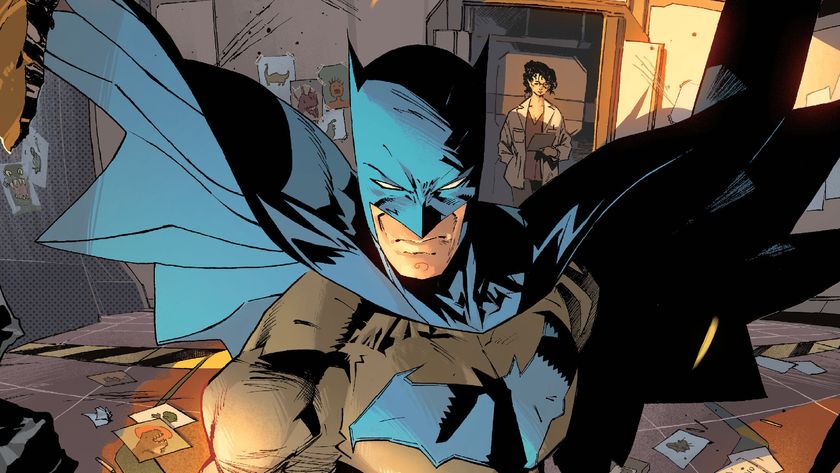
A new Batman #1 from Matt Fraction and Jorge Jiménez launches this September with a "revamped aesthetic," a throwback costume, and a new Batmobile

Marvel reveals its full slate of May 2025 comics and covers featuring the Avengers, the X-Men, Spider-Man, and more

Former Witcher 3 lead says his new vampire RPG Blood of Dawnwalker has a smaller open world because "it feels more like you actually know the place" compared to "behemoths"
Most Popular




